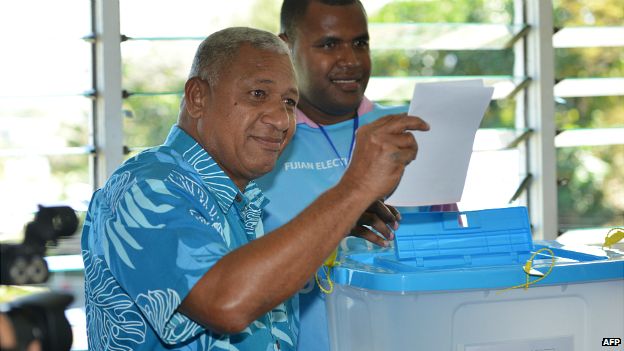Australia ends sanctions on Fiji after democratic elections
- Published

Australia has removed sanctions against Fiji after elections in the Pacific island nation last month ended eight years of military rule.
Ahead of visiting Fiji, Foreign Minister Julie Bishop said she was committed to "normalising" relations between the two countries.
Relations were strained after military chief Frank Bainimarama ousted Laisenia Qarase in a bloodless coup in 2006.
Fiji held elections last month, with Mr Bainimarama claiming an emphatic win.
"I announce the Australian government has lifted all remaining sanctions against Fiji," Ms Bishop said in a statement as she began a two-day trip to Fiji.
After meeting with her Fijian counterpart, Ratu Inoke Kubuabola, Ms Bishop said the two states would be "resuming a full defence and regional security relationship".
The United States has also announced that it is ending restrictions on financial aid to the government and on visas.
"We congratulate the people of Fiji on the swearing-in of a new government and the restoration of the country's parliament," US Ambassador Frankie Reed said in a statement.
'Credible elections'
Mr Bainimarama and his FijiFirst Party secured 32 out of the 50 seats in parliament and an outright majority, according to the Fijian Elections Office. His closest rival, the Sodelpa Party, won 15 seats.
International observers said the election, held on 17 September, was credible and conducted in a "atmosphere of calm".
Fiji has seen four coups since 1987 attributed mainly to tensions between indigenous Fijians and ethnic Indians.
In 2006, Mr Bainimarama ousted the elected government of Mr Qarase, accusing it of corruption and bias towards indigenous Fijians.
His authoritarian rule was seen as having brought stability and economic growth to the country but Australia and other nations had long been calling for polls to take place.
Human rights groups have accused Mr Bainimarama of placing severe restrictions on freedom of speech through media censorship and intimidation of critics, as well as interference with the judiciary.
- Published22 September 2014
- Published16 September 2014
- Published23 August 2023